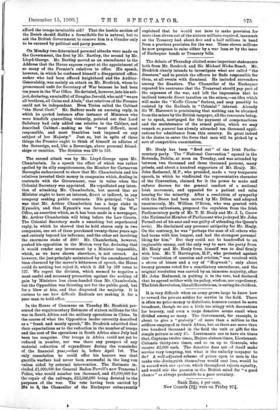The second attack was by Mr. Lloyd-George upon Mr. Chamberlain.
In a speech the effect of which was rather spoiled by its silly suspiciousness, the Member for Carnarvon Boroughs endeavoured to show that Mr. Chamberlain and his relatives invested their money in companies which, dealing in contracts with the Government, rose in value when the Colonial Secretary was appointed. He repudiated any inten- tion of attacking Mr. Chamberlain, but moved that no Minister ought to have an interest, direct or indirect, in any company seeking public contracts. His principal "fact" was that Mr. Arthur Chamberlain has a large stake in Kynoch's, and that Kynoch's was favoured by the War Office, an assertion which, as it has been made in a newspaper, Mr. Arthur Chamberlain will bring before the Law Courts. The Colonial Secretary made a smashing but superheated reply, in which he showed that he held shares only in two companies, one set of them purchased twenty-three years ago and entirely beyond his influence, and the other set involving the enormous stake of £60! Mr. Chamberlain, however, pushed his opposition to the Motion very far, declaring that it would render any investment by a Minister impossible, which, as we have shown elsewhere, is not correct. As however, the just principle maintained by the amendment had been obscured by the mover's bitterness of speech, the House could do nothing but reject it, which it did by 269 votes to 127. We regret the division, which seemed to negative a most useful and necessary precaution against the seeking of gain by Ministers less clean-handed than Mr. Chamberlain, 'ut the Opposition was thirsting not for the public good, but for a blow at him, and that disgusted the majority. It is curious to see how difficult Radicals are making it for a poor man to hold office.














































 Previous page
Previous page